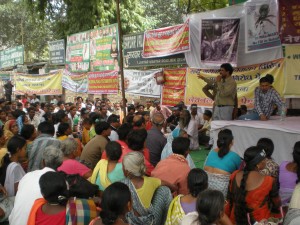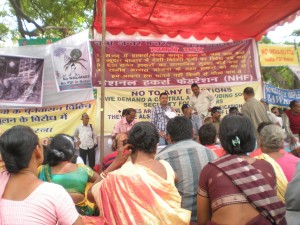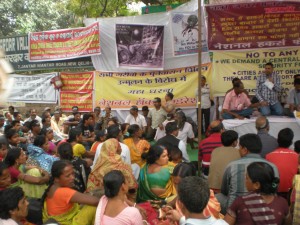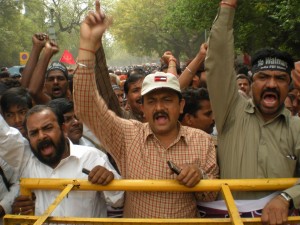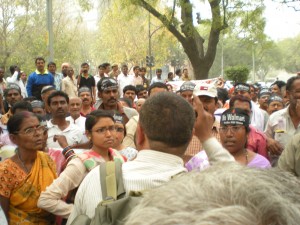Your cart is currently empty!
Day: March 16, 2013
Retail FDI & Farmers
September 25th, 2012
Dharmendra Kumar’s editorial page article on Retail FDI & Farmers published today by the national Daily Amar Ujala.
Indian Government Allows FDI in Multi-Brand Retail
Showing utter disregard to democratic institutions and expressions, Indian Government notified its decision to allow FDI in multi-brand retail, late evening on a day retail trade unions and majority of political parties observed nationwide strike to protest against such reform policies.
Notification FDI in MBRT 20 Sept 12 (1) Notification single brand retail FDI 20 Sept 12 (2)
India Strikes Against FDI Retail
September 20th, 2012
Today’s call for a nationwide strike (Bharat Bandh) by trade unions of street vendors, small traders, and most of the political parties from left to right and including of parties within the Govt. and parties supporting the Govt. was historical. Millions of retailers and thousands of trade associations observed the bandh demanding rollback of FDI in multi-brand retail. All major markets were closed through out India. Public transport was off the roads and colleges, schools, offices and transport services remain shut in most part of India. Trains were blocked by political activists of BJP, SP and CPI (ML) in many places including Bihar, Uttar Pradesh, West Bengal, Orissa and Jharkhand. The station Master of Patna Railway Station was locked. The impact of the strike was also seen in states of the North East. The bandh was total in Manipur. Banks, markets, shops and educational institutions were closed, with government offices recording low attendance in Meghalaya. Railway, road and others services were heavily impacted in Jharkhand. Most colleges reported only 20-50% attendance in Mumbai.In a sit in protest organised jointly by our campaign allies prominent national leaders from left to right shared the dais. NDA Convenor and JD(U) President Sharad Yadav asked the Congress to remove Prime Minister Manmohan Singh for this “attack on the bread of butter of 25 crore people”, while addressing the protest at Jantar Mantar. Eight parties including left parties and SP took out protest march towards Parliament and Mulayam Singh Yadav, Prakash Karat, AB Bardhan, Sitaram Yechury and Chandrababu Naidu courted arrest in parliament police station. BJP leader Venkaiah Naidu was detained in Hyderabad whereas Yeddyurappa and Ananth Kumar got arrested in Bangalore.On the other hand, Finance Minister P Chidambaram said to media that the nation-wide strike has caused a huge damage to the Indian economy and the common people. Big Business lobby group, CII reported to media that the nation-wide strike against the government decision to allow foreign direct investment (FDI) in multi-brand retail have caused losses to the tune of Rs12,500 crore ($2.25 billion) to the Indian economy.For Photos click:Update on Bharat Bandh Strike
September 18th, 2012
As the Govt. is in crisis after the pull out by 19 members of parliament of the Trinmool Congress in opposition to FDI in Multi Brand Retail, India is all set for a historical Bharat Bandh (all India strike) on 20th September. Our campaign allies including associations of street vendors, hawkers, independent shopkeepers, trade unions are all set for a complete bandh on 20th September to oppose FDI in retail.
All major markets would keep their shutters down throughout India. Markets in Kerala and Himachal Pradesh were closed on 18th Sept to oppose FDI in retail. Markets of both states will again remain closed on 20th September. As per reports of various trade and hawkers associations, there would be total bandh in other states as well including Punjab, Rajasthan, Uttar Pradesh, Uttarakhand, Madhya Pradesh, Orissa, Bihar, West Bengal, Assam, Gujrat, Maharashtra, Karnataka, Andhra Pradesh, Goa and Tamilnadu.
In Delhi, more than 300 trade associations would actively participate in the strike. Delhi Vyapar Mahasangh, All Delhi Chemist Association, Delhi Hindustani Mercantile Association, Kirana Committee, Chemical Merchants Association, Delhi Grain Merchant Association, Khari Bawli Sarva Vyapar Mandal, Chandni Chowk Sarva Vyapar Mandal, Delhi Electrical Traders Association, Federation of Delhi Trade Association, Rang Rasayan Vyapar Sangh, New Lajpat Roy Market Traders Association, Paper Merchant Association, Delhi Wedding and Greeting Cards Merchants Association, Delhi File Vikreta Sangh, Delhi Iron and Hardware Merchant association, Delhi Steel Tools and Hardware Traders Association, Federation of Sadar Bazar Traders Association, Confederation of Sadar Bazaar Traders Association, Kamla Nagar Jawahar Nagar Traders Association, Naraina Iron and Steel Merchant welfare association, Karol Bagh Traders Federation, Ajmal Khan Vyapar Mandal, Delhi Scooter Traders Association, New Delhi Traders Association, General Machinery Merchants Association, Readymade Garments Association, Khan Market Traders Associations, Automotive parts merchants association, Tractor parts merchants association, peepal Mahadev Traders Association, Daal and Besan Millers Association, Lajpat Nagar Traders Association, Laxmi Nagar Traders Association, Association of Readymade garment dealers, Barna steel metal merchant association, Delhi canvas merchant association, Delhi Tyres Dealers Association, Delhi Building Material Merchant association, Delhi Vegetable Oil Traders Association, Rajdhani Oil Suppliers Association, Gaffar Market Vyapar Mandal, Karol Bagh ewellers Association, Subhash Road Readymade Garment association, Kutub Road Traders Association, Surgical Traders Association, Sri Niwas puri Shopkeepers Association, Chandrawal Road Shopkeepers Association, Beeranpura Handloom Traders Association, Delhi Glass Bottles Traders Association, Ashok Vihar Traders Association, Shahadara Traders Association and many more have extended their support to the bandh.
Street Vendors and shopkeepers would organize protests and burn effigies of FDI in Retail in over hundred places through out Delhi. Leaders of various political parties are expected to join these protests. National Hawker Federation, Confederation of All India Traders, Bhartiya Udyog Vyapar Mandal etc. would organize protests at the Parliament as well.
Trinamool Congress Pulls out of UPA, Mamata accuses Congress of Acting Unilaterally
Agencies Kolkata, September 18, 2012An aggressive West Bengal chief minister Mamata Banerjee on Tuesday withdrew her Trinamool Congress’ support to the Congress-led UPA government. Banerjee told a news conference that Trinamool’s six ministers — one cabinet and five ministers of state — would submit their resignations to Prime Minister Manmohan Singh on Friday.“Our ministers will submit their resignations to the Prime Minister. We are withdrawing our support from UPA-2,” Banerjee said, speaking mainly in Bengali.The decision was taken at a three-hour meeting of Trinamool leaders following a hike in diesel prices, allowing FDI in multi-brand retail and capping the number of subsidized cooking gas cylinders to consumers.The Trinamool, with 19 members in the Lok Sabha, was the second largest constituent in the multi-party UPA.The decision brings the UPA’s effective strength in the 545-seat Lok Sabha from 273 to 254, which is slightly below the half-way mark.This would make the UPA more dependent on the Samajwadi Party and Bahujan Samaj Party, both of which extend outside legislative support to the UPA regime.At her presser, Banerjee lashed out at the Congress, saying the FDI decision was unveiled to divert attention from the coal blocks allocation controversy involving the government.She accused the Congress of acting unilaterally, without giving due respect to its allies. “We cannot tolerate this.”“If FDI is allowed in retail market, where will the retailers go? There will be a disaster,” she said.The Trinamool chief demanded to know why the government was not making efforts to bring back the huge volumes of black money allegedly stashed by Indians in foreign banks.“Somebody has to bell the cat,” she said, explaining her decision.Ahead of the crucial meeting of Trinamool Congress (TMC) parliamentary party, prominent leader Saugata Roy on Tuesday indicated that party could pull out its ministers from the Union council of minister if its rollback demands on FDI in retail, cap on LPG subsidy and diesel price hike were not met with.Asked to comment on Union finance minister P Chidambaram’s statement that the government will not roll back the decisions Trinamool Congress said “We know the Prime Minister has the last word.”Trinamool Congress (TMC), a regional party based in West Bengal state and led by firebrand politician Mamata Banerjee, had been a thorn in the side of Prime Minister Manmohan Singh’s administration since elections in 2009.Banerjee has already described the reform package as “anti-people”, saying a hike in diesel prices will spur inflation and that the opening of the retail sector to foreign multi-nationals will hurt millions of small traders.Last December, Banerjee’s refusal to accept retail reforms forced the government into a humiliating U-turn but the policy was re-launched last week.“If the (government) does not roll back the hike in diesel price and withdraw decisions in multi-brand retail, we will take decisions, however hard they may be,” she had told crowds in Kolkata at the weekend.The TMC, which has six ministers in the government and 19 MPs in the 543-seat Parliament, is due to meet in Kolkata town hall on Tuesday and make an announcement later in the day.Manmohan Singh insists the diesel price rise and economic reforms are needed to reverse a slowdown in economic growth and to boost public finances.On Friday, his cabinet cleared new rules inviting foreign supermarkets such as Walmart into the retail sector and allowing foreign airlines to take stakes in domestic carriers.The measures came soon after diesel rates were raised by a steep 12 percent, sparking protests across the country.Trade unions, backed by the main opposition Bharatiya Janata Party (BJP), have called for a nationwide strike on Thursday.Mamata Banerjee Opposing FDI in Retail
September 18th, 2012Trinmool Congress led by West Bengal Chief Minister Ms. Mamata Banerjee pulls out from the Govt. opposing FDI in Retail. Her ministers would submit resignation to the Prime Minister on Friday.We all have given a call for all India strike on thursday. Almost all political parties are supporting the shut down. Believe me everything in India would be on halt except essential services on Thursday. We would be holding protests as well.Dharmenda KumarGovernment Press on FDI Retail Approval
September 2012Permitting FDI in multi-brand product retail tradingThe Cabinet has approved the proposal of the Department of Industrial Policy & Promotion for permitting FDI in multi-brand retail trading, subject to specified conditions.The proposal had earlier been approved by the Cabinet in its meeting on 24.11.2011. However, implementation of the proposal had been deferred, for evolving a broader consensus on the subject.In pursuance of the aforestated decision of the Cabinet on 7.12.2011, discussions have been held with State Governments, representatives of consumer associations/organizations, micro & small industry associations, farmers’ associations and representatives of food processing industry and industry associations. The Chief Ministers of Delhi, Assam, Maharashtra, Andhra Pradesh, Rajasthan, Uttarakhand, Haryana and Governments of the State of Manipur and the Union Territory of Daman & Diu and Dadra and Nagar Haveli, have expressed support for the policy in writing. The Chief Minister of Jammu & Kashmir, through his press statements, has publicly endorsed the policy and asked for its implementation. The State Governments of Bihar, Karnataka, Kerala, Madhya Pradesh, Tripura and Odisha have expressed reservations.
During the consultations with the stakeholders, views for and against FDI in multi-brand retail trading were expressed. On balance, however, the discussions generally indicated support for the policy, subject to the introduction of adequate safeguards.
Accordingly, the following proposals have been approved:
(i) Retail sales outlets may be set up in those States which have agreed or agree in future to allow FDI in MBRT under this policy. The establishment of the retail sales outlets will be in compliance of applicable State laws/ regulations, such as the Shops and Establishments Act etc.
(ii) Retail sales outlets may be set up only in cities with a population of more than 10 lakh as per 2011 Census and may also cover an area of 10 kms around the municipal/urban agglomeration limits of such cities; retail locations will be restricted to conforming areas as per the Master/Zonal Plans of the concerned cities and provision will be made for requisite facilities such as transport connectivity and parking; In States/ Union Territories not having cities with population of more than 10 lakh as per 2011 Census, retail sales outlets may be set up in the cities of their choice, preferably the largest city and may also cover an area of 10 kms around the municipal/urban agglomeration limits of such cities. The locations of such outlets will be restricted to conforming areas, as per the Master/Zonal Plans of the concerned cities and provision will be made for requisite facilities such as transport connectivity and parking.
(iii) At least 50% of total FDI brought in shall be invested in ‘backend infrastructure’ within three years of the induction of FDI, where ‘back-end infrastructure’ will include capital expenditure on all activities, excluding that on front-end units; for instance, back-end infrastructure will include investment made towards processing, manufacturing, distribution, design improvement, quality control, packaging, logistics, storage, ware-house, agriculture market produce infrastructure etc. Expenditure on land cost and rentals, if any, will not be counted for purposes of backend infrastructure.
(iv) A high-level group under the Minister of Consumer Affairs may be constituted to examine various issues concerning internal trade and make recommendations for internal trade reforms.
Other conditions/safeguards, approved by the Cabinet on 24.11.2012, would remain unchanged. The suspension of Government’s decision taken in the Cabinet meeting on 24.11.2011 to permit FDI up to 51% in MBRT, therefore, stands removed.
The respective State Governments administer the Shops & Establishment Act within their territorial jurisdiction. “Trade & Commerce within the State” is a subject allocated to the State Governments, under the Constitution of India. State Governments are also responsible for aspects ancillary to MBRT, such as zoning regulations, warehousing requirements, access, traffic, parking and other logistics. As such, the policy provides that it would be the prerogative of the State Governments to decide whether and where a multi-brand retailer, with FDI, is permitted to establish its sales outlets within the State. Therefore, implementation of the policy is not a mandatory requirement for all States.
Retail sales outlets may be set up only in cities with a population of more than 10 lakh as per 2011 Census (including an area of 10 kms around the municipal/urban agglomeration limits of such cities). On the other hand, States/ Union Terrritories, which do not have any city with a population exceeding 10 lakhs, but are desirous of implementing the policy, would have the flexibility to do so.
Thus, the revised condition gives primacy to the decision of the States in this regard, recognizing that the FDI policy constitutes, at best, an enabling framework for the purpose.
Adequate safeguards have been built into the policy, some of which have been further strengthened.
A three year timeframe has been fixed for setting up the back-end infrastructure, which includes capital expenditure on all activities, excluding that on front-end units; for instance, back-end infrastructure will include investment made towards processing, manufacturing, distribution, design improvement, quality control, packaging, logistics, storage, ware-house, agriculture market produce infrastructure etc. Expenditure on land cost and rentals, if any, will not be counted for purposes of backend infrastructure. This condition will bind the foreign investors to invest in critical back-end infrastructure, which is a felt need across the country. It would also make the foreign investors accountable for proper implementation of the condition.
The decision would benefit stakeholders across the entire span of the supply chain. Farmers stand to benefit from the significant reduction in post-harvest losses, expected to result from the strengthening of the backend infrastructure and enable the farmers to obtain a remunerative price for their produce. Small manufacturers will benefit from the conditionality requiring at least 30% procurement from Indian small industries, as this would enable them to get integrated with global retail chains. This, in turn, will enhance their capacity to export products from India. As far as small retailers are concerned, it is evident that organized retail already co-exists with small traders and the unorganized retail sector. Studies indicate that there has been a strong competitive response from the traditional retailers to these organized retailers, through improved business practices and technological upgradation. Global experience also indicates that organized and unorganized retail co-exist and grow. The young people joining the workforce will benefit from the creation of employment opportunities. Consumers stand to gain the most, firstly, from the lowering of prices that would result from supply chain efficiencies and secondly, through improvement in product quality, which would come about as a combined result of technological upgradation; efficient grading, sorting and packaging; testing and quality control and product standardization.
Implementation of the policy will facilitate greater FDI inflows, additional and quality employment, global best practices and benefit consumers and farmers in the long run, in terms of quality, price, greater supply chain efficiencies in the agricultural sector and development of critical backend infrastructure.
The high-level group, to be constituted under the Minister of Consumer Affairs, is expected to look into various aspects relating to internal trade, to make recommendations on internal trade reforms to the Government, whenever required. This is in response to a demand articulated by traders’ associations during the course of consultations. Reforms in internal trade will ensure distributional efficiencies and also that the benefits from trade are available to all sections of society.
Amendment of conditions in the policy on Foreign Direct Investment in single-brand product retail tradingThe Cabinet has approved the proposal of the Department of Industrial Policy & Promotion for amendment of the existing policy on Foreign Direct Investment in Single-Brand Product Retail Trading.Vide Press Note 1(2012 Series) dated 10.1. 2012, Government had permitted FDI, up to 100%, in single brand product retail trading, subject to specified conditions, including, interalia, the conditions that:(i) The foreign investor should be the owner of the brand.
(ii) In respect of proposals involving FDI beyond 51%, 30% sourcing would mandatorily have to be done from SMEs/ village and cottage industries artisans and craftsmen. ‘Small industries’ would be defined as industries which have a total investment in plant & machinery not exceeding US $ 1.00 million. This valuation refers to the value at the time of installation, without providing for depreciation. Further, if at any point in time, this valuation is exceeded, the industry shall not qualify as a ‘small industry’ for this purpose. The compliance of this condition will be ensured through self-certification by the company, which could be subsequently checked, by statutory auditors, from the duly certified accounts, which the investors will be required to maintain.
The CCEA has approved modification of the above mentioned conditions, for the activity of single brand product retail trading, as under:
(i) Only one non-resident entity, whether owner of the brand or otherwise, shall be permitted to undertake single brand product retail trading in the country, for the specific brand, through a legally tenable agreement, with the brand owner for undertaking single brand product retail trading in respect of the specific brand for which approval is being sought. The onus for ensuring compliance with this condition shall rest with the Indian entity carrying out single-brand product retail trading in India. The investing entity shall provide evidence to this effect at the time of seeking approval, including a copy of the licensing/ franchise/sub-licence agreement, specifically indicating compliance with the above condition.
(ii) In respect of proposals involving FDI beyond 51%, sourcing of 30%, of the value of goods purchased, will be done from India, preferably from MSMEs, village and cottage industries, artisans and craftsmen, in all sectors, where it is feasible. The quantum of domestic sourcing will be self-certified by the company, to be subsequently checked, by statutory auditors, from the duly certified accounts which the company will be required to maintain. For the purpose of ascertaining the sourcing requirement, the relevant entity would be the company, incorporated in India, which is the recipient of FDI for the purpose of carrying out single-brand product retail trading.
Amendment in the condition relating to brand-ownership has been felt necessary, in view of the fact that, globally, single brand retailers often adopt a variety of business models, wherein the brand owning entity and investor entities are kept separate, even though in some cases, they may be having the same parent. Some single brand retailers adopt models where there is no link between the investing arm and the brand owning arm. In such cases, the brand owner entity could issue an exclusive licence/franchise to the investor entity, to use the brand for the purpose of retail trading, either globally or for a specific region, through appropriate agreement/(s). Such business models were not found to be in consonance with the condition that the foreign investor should be the brand owner. In view of the fact that the global business models do not strictly conform to this condition, a number of investors, who would otherwise have looked at investments in India, may not be able to do so. Therefore, keeping in view the constraints being faced by genuine foreign investors with different business models, as mentioned above, it would facilitate investment if this condition is liberalised. However, in order to address the concern that more than one franchisee/licensee may apply for undertaking SBRT for the same brand, which could lead to difficulties in monitoring compliance and fixing responsibility for non-compliance of the specified conditions, it has been mandated that, only one non-resident entity, whether owner of the brand or otherwise, shall be permitted to undertake single brand product retail trading in the country, for the specific brand, through a legally tenable agreement, with the brand owner in respect of the specific brand for which approval is being sought. The onus for ensuring compliance with this condition shall rest with the Indian entity carrying out single-brand retail trading in India. The investing entity shall provide evidence to this effect at the time of seeking approval from Government, including a copy of the licensing/ franchise/sub-license agreement, specifically indicating compliance with the above condition.
Regarding the condition that 30% sourcing be mandatorily done from Indian small industry, investors have pointed out that it would be difficult to comply with this condition in the case of very specialized/high technology items. Global single brand retailers are often engaged in the business of retailing specialty/high-tech products. Such products are niche products, wherein it may not be viable for the foreign investors to build capacities wherever they engage in retailing, owing to the specialized requirements of quality and precision which the local small industry may not be able to provide. Investors are, therefore, of the view that the condition of 30% mandatory sourcing from Indian small industries/ village and cottage industries, artisans and craftsmen, is acting as a deterrent to the desired foreign investment in this activity.
The other category of products relate to the entire range from household appliances, utensils, furniture, crockery to furnishings, etc. These products are far more amenable to sourcing from MSMEs, village and cottage industries, artisans and craftsmen. Therefore, the proposed modification of the condition is envisaged to take into account the circumstances of both the specialized/high technology niche products, as well as the general category, covering a wide range of items. The fact that 30% domestic sourcing is being mandated would imply that the single brand retailers would have to build production capacities in the country, either in existing units, or set up new ones, catering specifically to their sourcing requirements. Hence, even the 30% domestic sourcing is expected to develop production capacities in the country, with the attendant global best practices, relating to design, production and quality. Since single brand retailers are global players, Indian suppliers and vendors to these retailers would have an opportunity of becoming a part of their global supply chains. Thus, Indian products could find their way in the stores of these single brand retailers located in other countries, thereby augmenting exports from India as well.
Thus, the amended condition relating to sourcing of 30%, of the value of goods purchased, being done from India, preferably from MSMEs, village and cottage industries, artisans and craftsmen, in all sectors, where feasible, is expected to benefit Indian producers, including the Indian handicrafts sector, which provides livelihood to millions and is important from the point of low capital investment, high value-addition and high potential for export, as also to meet the critical need to integrate Indian producers with the domestic and global markets. Skill integration with craftsmen abroad is likely to help develop synergies with international brands and generate more employment. The consequential benefits, arising from the integration of global best practices in management, along with global standards in quality, design, packaging and production, would help build capacities of local producers, by making it worthwhile for them to scale-up their production, thereby creating a multiplier effect on employment and income generation. This would also lead to up-gradation of technology, which, in turn, would have a further multiplier effect on the economy.

